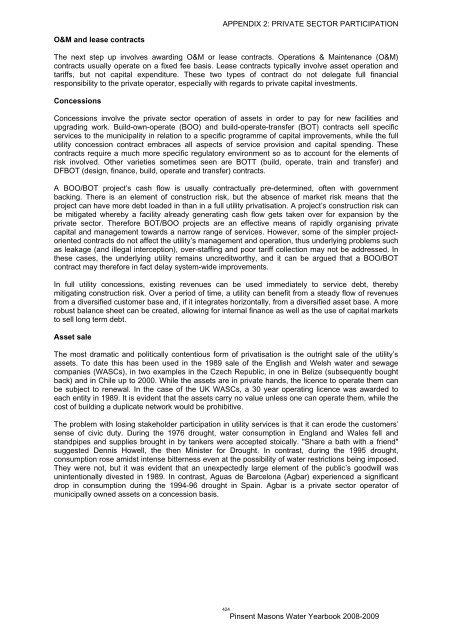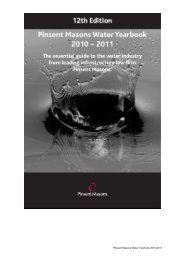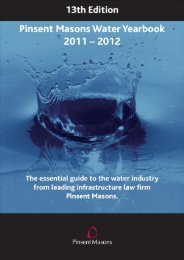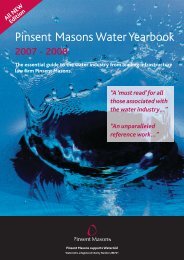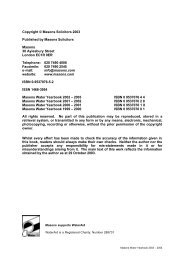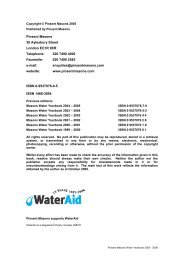- Page 1 and 2:
I Pinsent Masons Water Yearbook 200
- Page 3 and 4:
PINSENT MASONS WATER YEARBOOK 2008-
- Page 5 and 6:
many countries, it has to be debata
- Page 7 and 8:
PINSENT MASONS WATER SECTOR GROUP P
- Page 9 and 10:
CONTENTS CONTENTS Please click on p
- Page 11 and 12:
CONTENTS AUSTRALIA: UNITED GROUP LI
- Page 13 and 14:
CONTENTS MALAYSIA: YTL CORPORATION
- Page 15 and 16:
INTRODUCTION INTRODUCTION This is t
- Page 17 and 18:
INTRODUCTION Another concern is the
- Page 19 and 20:
PART 1: THE WORLD OF WATER 2008-200
- Page 21 and 22:
PART 1: THE WORLD OF WATER 2008-200
- Page 23 and 24:
PART 1: THE WORLD OF WATER 2008-200
- Page 25 and 26:
PART 1: THE WORLD OF WATER 2008-200
- Page 27 and 28:
PART 1: THE WORLD OF WATER 2008-200
- Page 29 and 30:
PART 1: THE WORLD OF WATER 2008-200
- Page 31 and 32:
PART 1: THE WORLD OF WATER 2008-200
- Page 33 and 34:
PART 1: THE WORLD OF WATER 2008-200
- Page 35 and 36:
PART 1: THE WORLD OF WATER 2008-200
- Page 37 and 38:
PART 1: THE WORLD OF WATER 2008-200
- Page 39 and 40:
PART 1: THE WORLD OF WATER 2008-200
- Page 41 and 42:
PART 1: THE WORLD OF WATER 2008-200
- Page 43 and 44:
PART 1: THE WORLD OF WATER 2008-200
- Page 45 and 46:
PART 1: THE WORLD OF WATER 2008-200
- Page 47 and 48:
PART 1: THE WORLD OF WATER 2008-200
- Page 49 and 50:
PART 1: THE WORLD OF WATER 2008-200
- Page 51 and 52:
PART 1: THE WORLD OF WATER 2008-200
- Page 53 and 54:
PART 1: THE WORLD OF WATER 2008-200
- Page 55 and 56:
PART 1: THE WORLD OF WATER 2008-200
- Page 57 and 58:
PART 1: THE WORLD OF WATER 2008-200
- Page 59 and 60:
PART 1: THE WORLD OF WATER 2008-200
- Page 61 and 62:
PART 1: THE WORLD OF WATER 2008-200
- Page 63 and 64:
PART 1: THE WORLD OF WATER 2008-200
- Page 65 and 66:
PART 1: THE WORLD OF WATER 2008-200
- Page 67 and 68:
PART 1: THE WORLD OF WATER 2008-200
- Page 69 and 70:
PART 1: THE WORLD OF WATER 2008-200
- Page 71 and 72:
PART 1: THE WORLD OF WATER 2008-200
- Page 73 and 74:
PART 2: COUNTRY ANALYSIS PART 2: CO
- Page 75 and 76:
ARGENTINA PART 2: COUNTRY ANALYSIS
- Page 77 and 78:
ARGENTINA PART 2: COUNTRY ANALYSIS
- Page 79 and 80:
AUSTRALIA PART 2: COUNTRY ANALYSIS
- Page 81 and 82:
AUSTRALIA PART 2: COUNTRY ANALYSIS
- Page 83 and 84:
AUSTRALIA PART 2: COUNTRY ANALYSIS
- Page 85 and 86:
BANGLADESH PART 2: COUNTRY ANALYSIS
- Page 87 and 88:
BELIZE PART 2: COUNTRY ANALYSIS BEL
- Page 89 and 90:
BOLIVIA PART 2: COUNTRY ANALYSIS fr
- Page 91 and 92:
BRAZIL PART 2: COUNTRY ANALYSIS BRA
- Page 93 and 94:
BRAZIL PART 2: COUNTRY ANALYSIS Mar
- Page 95 and 96:
BRAZIL PART 2: COUNTRY ANALYSIS Bra
- Page 97 and 98:
CAMBODIA PART 2: COUNTRY ANALYSIS C
- Page 99 and 100:
CANADA PART 2: COUNTRY ANALYSIS Sou
- Page 101 and 102:
CHILE PART 2: COUNTRY ANALYSIS CHIL
- Page 103 and 104:
CHILE PART 2: COUNTRY ANALYSIS Agri
- Page 105 and 106:
CHINA PART 2: COUNTRY ANALYSIS CHIN
- Page 107 and 108:
CHINA PART 2: COUNTRY ANALYSIS Acco
- Page 109 and 110:
CHINA PART 2: COUNTRY ANALYSIS Esti
- Page 111 and 112:
CHINA PART 2: COUNTRY ANALYSIS Grou
- Page 113 and 114:
CHINA PART 2: COUNTRY ANALYSIS MAJO
- Page 115 and 116:
CHINA PART 2: COUNTRY ANALYSIS In t
- Page 117 and 118:
CHINA PART 2: COUNTRY ANALYSIS also
- Page 119 and 120:
COLOMBIA PART 2: COUNTRY ANALYSIS C
- Page 121 and 122:
COLOMBIA PART 2: COUNTRY ANALYSIS M
- Page 123 and 124:
CUBA PART 2: COUNTRY ANALYSIS CUBA
- Page 125 and 126:
ECUADOR PART 2: COUNTRY ANALYSIS EC
- Page 127 and 128:
INDIA PART 2: COUNTRY ANALYSIS INDI
- Page 129 and 130:
INDIA PART 2: COUNTRY ANALYSIS with
- Page 131 and 132:
INDIA PART 2: COUNTRY ANALYSIS Reco
- Page 133 and 134:
INDIA PART 2: COUNTRY ANALYSIS can
- Page 135 and 136:
INDIA PART 2: COUNTRY ANALYSIS MAJO
- Page 137 and 138:
INDONESIA PART 2: COUNTRY ANALYSIS
- Page 139 and 140:
INDONESIA PART 2: COUNTRY ANALYSIS
- Page 141 and 142:
INDONESIA PART 2: COUNTRY ANALYSIS
- Page 143 and 144:
JAPAN PART 2: COUNTRY ANALYSIS Seco
- Page 145 and 146:
JAPAN PART 2: COUNTRY ANALYSIS comp
- Page 147 and 148:
KAZAKHSTAN REPUBLIC PART 2: COUNTRY
- Page 149 and 150:
MALAYSIA PART 2: COUNTRY ANALYSIS M
- Page 151 and 152:
MALAYSIA PART 2: COUNTRY ANALYSIS P
- Page 153 and 154:
MALAYSIA PART 2: COUNTRY ANALYSIS S
- Page 155 and 156:
MEXICO PART 2: COUNTRY ANALYSIS MEX
- Page 157 and 158:
MEXICO PART 2: COUNTRY ANALYSIS Goa
- Page 159 and 160:
MEXICO PART 2: COUNTRY ANALYSIS Gov
- Page 161 and 162:
NEPAL PART 2: COUNTRY ANALYSIS NEPA
- Page 163 and 164:
NEW ZEALAND PART 2: COUNTRY ANALYSI
- Page 165 and 166:
PAKISTAN PART 2: COUNTRY ANALYSIS P
- Page 167 and 168:
PAKISTAN PART 2: COUNTRY ANALYSIS P
- Page 169 and 170:
PARAGUAY PART 2: COUNTRY ANALYSIS P
- Page 171 and 172:
PERU PART 2: COUNTRY ANALYSIS propo
- Page 173 and 174:
PERU PART 2: COUNTRY ANALYSIS Conso
- Page 175 and 176:
PHILIPPINES PART 2: COUNTRY ANALYSI
- Page 177 and 178:
PHILIPPINES PART 2: COUNTRY ANALYSI
- Page 179 and 180:
PHILIPPINES PART 2: COUNTRY ANALYSI
- Page 181 and 182:
SINGAPORE PART 2: COUNTRY ANALYSIS
- Page 183 and 184:
SOUTH KOREA PART 2: COUNTRY ANALYSI
- Page 185 and 186:
SRI LANKA PART 2: COUNTRY ANALYSIS
- Page 187 and 188:
TAIWAN PART 2: COUNTRY ANALYSIS TAI
- Page 189 and 190:
TAIWAN PART 2: COUNTRY ANALYSIS Eff
- Page 191 and 192:
TAIWAN PART 2: COUNTRY ANALYSIS Not
- Page 193 and 194:
THAILAND PART 2: COUNTRY ANALYSIS R
- Page 195 and 196:
TRINIDAD AND TOBAGO PART 2: COUNTRY
- Page 197 and 198:
UNITED STATES OF AMERICA PART 2: CO
- Page 199 and 200:
UNITED STATES OF AMERICA PART 2: CO
- Page 201 and 202:
UNITED STATES OF AMERICA PART 2: CO
- Page 203 and 204:
UNITED STATES OF AMERICA PART 2: CO
- Page 205 and 206:
URUGUAY PART 2: COUNTRY ANALYSIS an
- Page 207 and 208:
VENEZUELA PART 2: COUNTRY ANALYSIS
- Page 209 and 210:
VIETNAM PART2: COUNTRY ANALYSIS VIE
- Page 211 and 212:
VIETNAM PART2: COUNTRY ANALYSIS Pri
- Page 213 and 214:
FRANCE PART 3(i): COMPANY ANALYSIS
- Page 215 and 216:
FRANCE PART 3(i): COMPANY ANALYSIS
- Page 217 and 218:
FRANCE PART 3(i): COMPANY ANALYSIS
- Page 219 and 220:
FRANCE PART 3(i): COMPANY ANALYSIS
- Page 221 and 222:
FRANCE PART 3(i): COMPANY ANALYSIS
- Page 223 and 224:
FRANCE PART 3(i): COMPANY ANALYSIS
- Page 225 and 226:
FRANCE PART 3(i): COMPANY ANALYSIS
- Page 227 and 228:
FRANCE PART 3(i): COMPANY ANALYSIS
- Page 229 and 230:
FRANCE PART 3(i): COMPANY ANALYSIS
- Page 231 and 232:
FRANCE PART 3(i): COMPANY ANALYSIS
- Page 233 and 234:
FRANCE PART 3(i): COMPANY ANALYSIS
- Page 235 and 236:
FRANCE PART 3(i): COMPANY ANALYSIS
- Page 237 and 238:
FRANCE PART 3(i): COMPANY ANALYSIS
- Page 239 and 240:
PART 3(i): COMPANY ANALYSIS MAJOR P
- Page 241 and 242:
PART 3(i): COMPANY ANALYSIS MAJOR P
- Page 243 and 244:
PART 3(i): COMPANY ANALYSIS MAJOR P
- Page 245 and 246:
PART 3(i): COMPANY ANALYSIS MAJOR P
- Page 247 and 248:
PART 3(i): COMPANY ANALYSIS MAJOR P
- Page 249 and 250:
PART 3(i): COMPANY ANALYSIS MAJOR P
- Page 251 and 252:
PART 3(i): COMPANY ANALYSIS MAJOR P
- Page 253 and 254:
PART 3(i): COMPANY ANALYSIS MAJOR P
- Page 255 and 256:
PART 3(i): COMPANY ANALYSIS MAJOR P
- Page 257 and 258:
PART 3(i): COMPANY ANALYSIS MAJOR P
- Page 259 and 260:
PART 3(i): COMPANY ANALYSIS MAJOR P
- Page 261 and 262:
PART 3(i): COMPANY ANALYSIS MAJOR P
- Page 263 and 264:
PART 3(i): COMPANY ANALYSIS MAJOR P
- Page 265 and 266:
GERMANY PART 3(i): COMPANY ANALYSIS
- Page 267 and 268:
GERMANY PART 3(i): COMPANY ANALYSIS
- Page 269 and 270:
ITALY PART 3(i): COMPANY ANALYSIS M
- Page 271 and 272:
ITALY PART 3(i): COMPANY ANALYSIS M
- Page 273 and 274:
ITALY PART 3(i): COMPANY ANALYSIS M
- Page 275 and 276:
SPAIN PART 3(i): COMPANY ANALYSIS M
- Page 277 and 278:
SPAIN PART 3(i): COMPANY ANALYSIS M
- Page 279 and 280:
SPAIN PART 3(i): COMPANY ANALYSIS M
- Page 281 and 282:
UNITED KINGDOM PART 3(i): COMPANY A
- Page 283 and 284:
UNITED KINGDOM PART 3(i): COMPANY A
- Page 285 and 286:
UNITED KINGDOM PART 3(i): COMPANY A
- Page 287 and 288:
UNITED KINGDOM PART 3(i): COMPANY A
- Page 289 and 290:
PART 3(i): COMPANY ANALYSIS MAJOR P
- Page 291 and 292:
PART 3(i): COMPANY ANALYSIS MAJOR P
- Page 293 and 294:
PART 3(i): COMPANY ANALYSIS MAJOR P
- Page 295 and 296:
ARGENTINA PART 3(ii): COMPANY ANALY
- Page 297 and 298:
AUSTRALIA PART 3(ii): COMPANY ANALY
- Page 299 and 300:
BRAZIL PART 3(ii): COMPANY ANALYIS
- Page 301 and 302:
BRAZIL PART 3(ii): COMPANY ANALYIS
- Page 303 and 304:
BRAZIL PART 3(ii): COMPANY ANALYIS
- Page 305 and 306:
CAYMAN ISLANDS PART 3(ii): COMPANY
- Page 307 and 308:
CHILE PART 3(ii): COMPANY ANALYIS L
- Page 309 and 310:
CHILE PART 3(ii): COMPANY ANALYIS L
- Page 311 and 312:
CHILE PART 3(ii): COMPANY ANALYIS L
- Page 313 and 314:
CHILE PART 3(ii): COMPANY ANALYIS L
- Page 315 and 316:
CHILE PART 3(ii): COMPANY ANALYIS L
- Page 317 and 318:
CHINA PART 3(ii): COMPANY ANALYIS L
- Page 319 and 320:
CHINA PART 3(ii): COMPANY ANALYIS L
- Page 321 and 322:
CHINA PART 3(ii): COMPANY ANALYIS L
- Page 323 and 324:
CHINA PART 3(ii): COMPANY ANALYIS L
- Page 325 and 326:
CHINA PART 3(ii): COMPANY ANALYIS L
- Page 327 and 328:
CHINA PART 3(ii): COMPANY ANALYIS L
- Page 329 and 330:
CHINA PART 3(ii): COMPANY ANALYIS L
- Page 331 and 332:
CHINA PART 3(ii): COMPANY ANALYIS L
- Page 333 and 334:
CHINA PART 3(ii): COMPANY ANALYIS L
- Page 335 and 336:
CHINA PART 3(ii): COMPANY ANALYIS L
- Page 337 and 338:
CHINA PART 3(ii): COMPANY ANALYIS L
- Page 339 and 340:
CHINA PART 3(ii): COMPANY ANALYIS L
- Page 341 and 342:
CHINA PART 3(ii): COMPANY ANALYIS L
- Page 343 and 344:
CHINA PART 3(ii): COMPANY ANALYIS L
- Page 345 and 346:
CHINA PART 3(ii): COMPANY ANALYIS L
- Page 347 and 348:
CHINA PART 3(ii): COMPANY ANALYIS L
- Page 349 and 350:
CHINA PART 3(ii): COMPANY ANALYIS L
- Page 351 and 352:
CHINA PART 3(ii): COMPANY ANALYIS L
- Page 353 and 354:
CHINA PART 3(ii): COMPANY ANALYIS L
- Page 355 and 356:
CHINA PART 3(ii): COMPANY ANALYIS L
- Page 357 and 358:
INDIA IVRCL CONSTRUCTION AND PROJEC
- Page 359 and 360:
INDIA LARSEN & TOUBRO PART 3(ii): C
- Page 361 and 362:
MALAYSA PART 3(ii): COMPANY ANALYSI
- Page 363 and 364:
MALAYSA PART 3(ii): COMPANY ANALYSI
- Page 365 and 366:
MALAYSA PART 3(ii): COMPANY ANALYSI
- Page 367 and 368:
MALAYSA PART 3(ii): COMPANY ANALYSI
- Page 369 and 370:
MALAYSA PART 3(ii): COMPANY ANALYSI
- Page 371 and 372:
MALAYSA PART 3(ii): COMPANY ANALYSI
- Page 373 and 374:
MALAYSA PART 3(ii): COMPANY ANALYSI
- Page 375 and 376:
MEXICO PART 3(ii): COMPANY ANALYSIS
- Page 377 and 378:
PHILLIPINES PART 3(ii): COMPANY ANA
- Page 379 and 380:
SINGAPORE PART 3(ii): COMPANY ANALY
- Page 381 and 382:
SINGAPORE PART 3(ii): COMPANY ANALY
- Page 383 and 384:
SINGAPORE PART 3(ii): COMPANY ANALY
- Page 385 and 386:
SINGAPORE PART 3(ii): COMPANY ANALY
- Page 387 and 388:
SINGAPORE PART 3(ii): COMPANY ANALY
- Page 389 and 390:
SINGAPORE PART 3(ii): COMPANY ANALY
- Page 391 and 392: SINGAPORE PART 3(ii): COMPANY ANALY
- Page 393 and 394: THAILAND PART 3(ii): COMPANY ANALYS
- Page 395 and 396: THAILAND PART 3(ii): COMPANY ANALYS
- Page 397 and 398: USA PART 3(ii): COMPANY ANALYSIS: L
- Page 399 and 400: USA PART 3(ii): COMPANY ANALYSIS: L
- Page 401 and 402: USA PART 3(ii): COMPANY ANALYSIS: L
- Page 403 and 404: USA PART 3(ii): COMPANY ANALYSIS: L
- Page 405 and 406: USA PART 3(ii): COMPANY ANALYSIS: L
- Page 407 and 408: USA PART 3(ii): COMPANY ANALYSIS: L
- Page 409 and 410: USA PART 3(ii): COMPANY ANALYSIS: L
- Page 411 and 412: USA PART 3(ii): COMPANY ANALYSIS: L
- Page 413 and 414: USA PART 3(ii): COMPANY ANALYSIS: L
- Page 415 and 416: USA PART 3(ii): COMPANY ANALYSIS: L
- Page 417 and 418: USA PART 3(ii): COMPANY ANALYSIS: L
- Page 419 and 420: USA PART 3(ii): COMPANY ANALYSIS: L
- Page 421 and 422: USA PART 3(ii): COMPANY ANALYSIS: L
- Page 423 and 424: USA PART 3(ii): COMPANY ANALYSIS: L
- Page 425 and 426: USA PART 3(ii): COMPANY ANALYSIS: L
- Page 427 and 428: USA PART 3(ii): COMPANY ANALYSIS: L
- Page 429 and 430: USA PART 3(ii): COMPANY ANALYSIS: L
- Page 431 and 432: USA PART 3(ii): COMPANY ANALYSIS: L
- Page 433 and 434: APPENDIX 1: THE WATER CYCLE AND WAT
- Page 435 and 436: People living in areas of water str
- Page 437 and 438: APPENDIX 1: THE WATER CYCLE & WATER
- Page 439 and 440: APPENDIX 2: PRIVATE SECTOR PARTICIP
- Page 441: APPENDIX 2: PRIVATE SECTOR PARTICIP
- Page 445 and 446: APPENDIX 2: PRIVATE SECTOR PARTICIP
- Page 447 and 448: APPENDIX 2: PRIVATE SECTOR PARTICIP
- Page 449 and 450: APPENDIX 2: PRIVATE SECTOR PARTICIP
- Page 451 and 452: APPENDIX 2: PRIVATE SECTOR PARTICIP
- Page 453 and 454: APPENDIX 3: THE PRIVATE SECTOR AND
- Page 455 and 456: APPENDIX 3: THE PRIVATE SECTOR AND
- Page 457 and 458: APPENDIX 3: THE PRIVATE SECTOR AND
- Page 459 and 460: APPENDIX 3: THE PRIVATE SECTOR AND
- Page 461 and 462: APPENDIX 3: THE PRIVATE SECTOR AND
- Page 463 and 464: APPENDIX 3: THE PRIVATE SECTOR AND
- Page 465 and 466: APPENDIX 3: THE PRIVATE SECTOR AND
- Page 467 and 468: APPENDIX 4: GLOSSARY OF WATER AND F
- Page 469 and 470: APPENDIX 4: GLOSSARY OF WATER AND F
- Page 471 and 472: APPENDIX 4: GLOSSARY OF WATER AND F
- Page 473 and 474: APPENDIX 4: GLOSSARY OF WATER AND F
- Page 475 and 476: APPENDIX 4: GLOSSARY OF WATER AND F
- Page 477 and 478: APPENDIX 5: REFERENCES AND FURTHER
- Page 479 and 480: APPENDIX 5: REFERENCES AND FURTHER
- Page 481 and 482: APPENDIX 5: REFERENCES AND FURTHER
- Page 483 and 484: APPENDIX 5: REFERENCES AND FURTHER
- Page 485 and 486: APPENDIX 5: REFERENCES AND FURTHER
- Page 487 and 488: APPENDIX 5: REFERENCES AND FURTHER
- Page 489: APPENDIX 5: REFERENCES AND FURTHER


